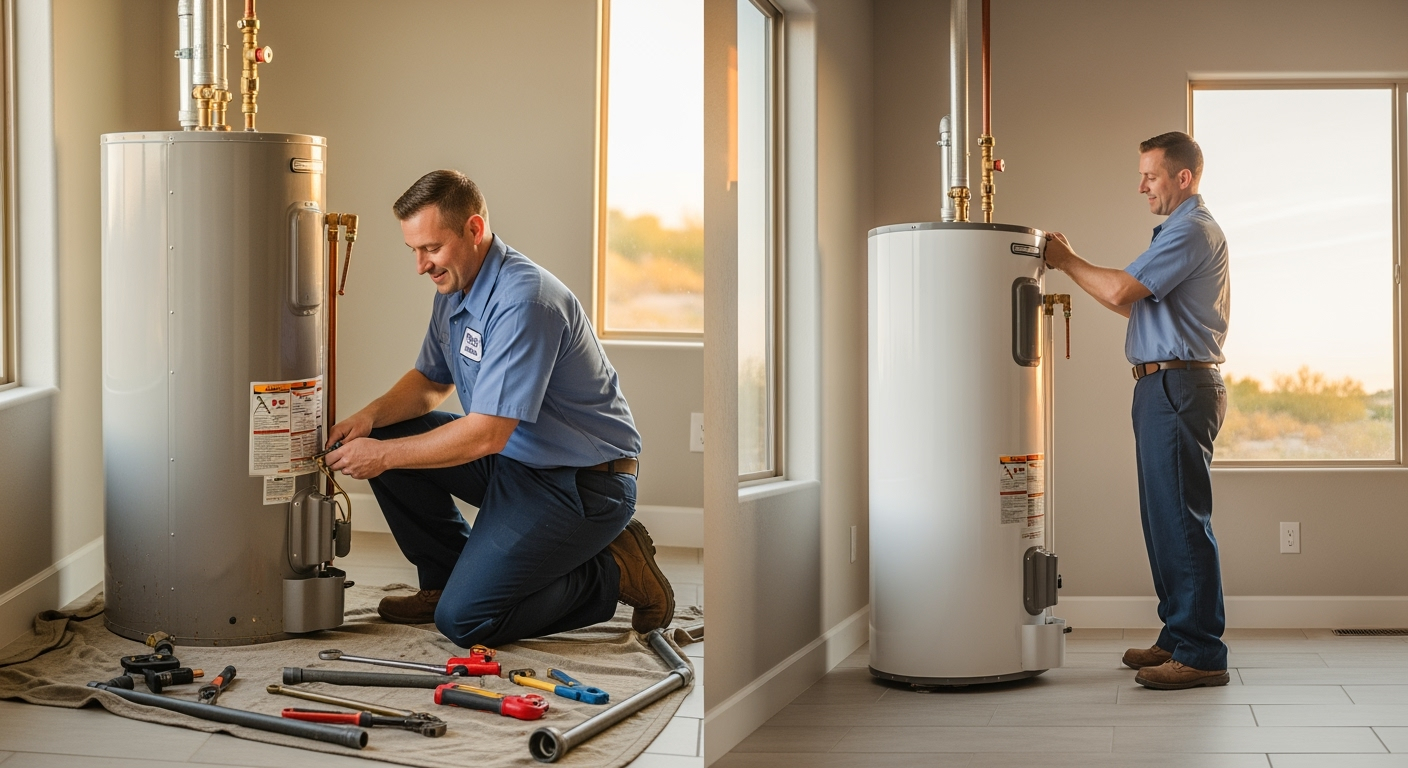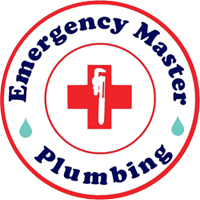

In the scorching heat of Phoenix, Arizona, a reliable water heater isn’t just a convenience—it’s a necessity. Whether you’re dealing with a sudden lack of hot water during a summer shower or noticing strange noises from your unit, deciding between water heater repair and replacement can feel overwhelming. As temperatures soar above 100°F for months on end, your water heater works overtime, leading to faster wear and tear. This comprehensive guide will help you navigate the decision-making process, weighing factors like cost, efficiency, and local conditions in Phoenix. We’ll explore signs of trouble, pros and cons of each option, and expert tips to ensure your home stays comfortable year-round.
If you’re a Phoenix resident facing water heater issues, understanding your options can save you time, money, and frustration. Drawing from years of experience in plumbing services across the Valley of the Sun, this article provides practical, problem-solving advice to help you make an informed choice. Let’s dive in and determine whether repair or replacement is the right path for your situation.
Understanding Water Heaters in Phoenix’s Unique Climate
Phoenix’s desert climate presents specific challenges for water heaters. With hard water from the Colorado River supply, mineral buildup (like calcium and magnesium) can clog tanks and reduce efficiency. High summer temperatures also mean your unit cycles more frequently, accelerating breakdowns. According to the U.S. Department of Energy, water heaters account for about 18% of a home’s energy use, and in hot climates like Arizona, inefficient units can spike utility bills.
Common types of water heaters in Phoenix homes include traditional tank-style (gas or electric), tankless (on-demand), and heat pump models. Gas units are popular due to lower operating costs, but they require proper venting in our dry environment to prevent issues like carbon monoxide buildup. If your water heater is over 10 years old—a typical lifespan—it’s time to evaluate its condition. Ignoring problems can lead to leaks, flooding, or even health risks from poor water quality.
Signs Your Water Heater Needs Attention
Before deciding on repair or replacement, identify the symptoms. Early detection can prevent emergencies, especially during Phoenix’s monsoon season when power outages might exacerbate issues.
- No Hot Water or Inconsistent Temperatures: This could stem from a faulty thermostat, sediment buildup, or a broken heating element. In Phoenix’s hard water, sediment accumulates quickly, reducing heating efficiency.
- Strange Noises: Rumbling or popping sounds often indicate mineral deposits at the tank’s bottom. If ignored, this can lead to cracks and leaks.
- Leaking Water: Puddles around the base might signal a corroded tank or loose connections. In Arizona’s dry air, evaporation can mask small leaks until they worsen.
- Rusty Water or Discoloration: This points to internal corrosion, common in older units exposed to mineral-rich water.
- Higher Energy Bills: If your bills are climbing without increased usage, your water heater might be working harder due to inefficiency.
- Age of the Unit: Most last 8-12 years. In Phoenix, where units face extreme conditions, they may fail sooner.
If you notice these signs, don’t delay—a professional inspection is crucial. Delaying can turn a simple repair into a full replacement, costing you more in the long run.
The Pros and Cons of Water Heater Repair
Repairing your water heater is often the first line of defense, especially if the issue is minor and the unit is relatively new. In Phoenix, where quick fixes can restore comfort amid triple-digit heat, repairs make sense for budget-conscious homeowners.
Advantages of Repair
- Cost-Effective: Repairs typically range from $150 to $600, far less than a $1,000-$3,000 replacement. For example, replacing a heating element or flushing sediment might cost under $300.
- Quick Resolution: Many repairs can be done in a few hours, minimizing downtime. This is ideal during Phoenix’s hot summers when you can’t afford to go without hot water.
- Extends Lifespan: Addressing issues like anode rod replacement or valve repairs can add years to your unit’s life, improving energy efficiency and reducing bills.
- Eco-Friendly: Repairing instead of replacing reduces waste, aligning with sustainable practices encouraged by Arizona’s environmental initiatives.
Disadvantages of Repair
- Temporary Fix: If the unit is old, repairs might only delay inevitable failure. In Phoenix’s harsh conditions, repeated fixes can become a cycle of expenses.
- Hidden Problems: What seems like a simple issue could mask deeper corrosion, leading to unexpected breakdowns.
- Warranty Limitations: Repairs might void warranties if not done by certified professionals, and parts availability can be an issue for older models.
For instance, if your gas water heater has a pilot light that won’t stay lit—a common Phoenix problem due to dust and dry air—a repair like cleaning the thermocouple could solve it affordably. However, if corrosion is widespread, repair might not be worthwhile.
The Pros and Cons of Water Heater Replacement
When repairs aren’t sufficient, replacement offers a fresh start. In Phoenix, upgrading to a more efficient model can combat high energy costs and adapt to local water quality issues.
Advantages of Replacement
- Improved Efficiency: New models, like tankless or ENERGY STAR-rated units, can cut energy use by 30-50%, per the EPA. In Arizona’s climate, this translates to significant savings on APS or SRP bills.
- Long-Term Savings: Though upfront costs are higher ($800-$4,000 including installation), replacements pay off through lower maintenance and energy expenses over 10-15 years.
- Advanced Features: Modern units include smart controls, better insulation, and sediment-resistant designs tailored for hard water areas like Phoenix.
- Increased Home Value: A new water heater can boost your property’s appeal, especially in competitive real estate markets like Scottsdale or Tempe.
- Warranty Protection: New installations often come with 6-12 year warranties, providing peace of mind.
Disadvantages of Replacement
- Higher Initial Cost: Budgeting for installation, permits, and potential upgrades (like gas line modifications) can be daunting.
- Installation Downtime: Replacement might take a full day, leaving you without hot water temporarily—problematic in Phoenix’s heat.
- Environmental Impact: Disposing of the old unit requires proper recycling to avoid landfill contributions.
Consider a scenario: If your 15-year-old tank is leaking due to hard water damage, replacing it with a tankless model could eliminate storage issues and provide endless hot water, perfect for larger Phoenix households.
Key Factors to Consider in Phoenix, Arizona
Phoenix-specific elements heavily influence your decision. Our average water hardness is 15-20 grains per gallon, accelerating scale buildup. The Arizona Department of Environmental Quality notes that this can reduce heater efficiency by up to 20%. Additionally, extreme heat stresses components, making energy-efficient models a smart choice.
- Water Quality: Install a water softener alongside replacement to prevent future issues.
- Energy Source: Gas is cheaper in Arizona, but electric heat pumps qualify for rebates through programs like the federal Inflation Reduction Act.
- Home Size and Usage: Larger families might benefit from tankless replacements for on-demand supply.
- Local Regulations: Phoenix requires permits for installations, and seismic strapping is mandatory due to occasional earthquakes.
Cost-wise, repairs average $300-$500 locally, while replacements range from $1,200-$2,500, factoring in labor rates around $100/hour.
When to Repair vs. When to Replace: A Decision Guide
Use this problem-solving framework to decide:
- Assess Age: Under 8 years? Repair. Over 12? Replace.
- Evaluate Repair Costs: If repairs exceed 50% of replacement cost, opt for new.
- Check Efficiency: If your unit’s energy factor is below 0.90 (check the label), replacement could save hundreds annually.
- Frequency of Issues: Multiple repairs in a year? Time for replacement.
- Future Plans: Selling your home soon? A new unit adds value.
For example, a Phoenix homeowner with a 10-year-old unit facing sediment issues might repair by flushing the tank ($200), but if efficiency drops, replacing with a high-efficiency model ($1,500) yields better ROI.
Maintenance Tips to Avoid Future Problems
Prevention is key in Phoenix’s demanding environment:
- Annual Flushing: Remove sediment to maintain efficiency.
- Anode Rod Inspection: Replace every 3-5 years to prevent corrosion.
- Temperature Setting: Keep at 120°F to reduce energy use and scalding risks.
- Insulate Pipes: In cooler months, this conserves heat.
- Professional Tune-Ups: Schedule yearly checks to catch issues early.
Following these can extend your water heater’s life by 20-30%, per plumbing experts.
Conclusion: Making the Right Choice for Your Phoenix Home
Deciding between water heater repair and replacement boils down to your unit’s age, condition, and your long-term needs in Phoenix’s unique climate. Repairs offer quick, affordable fixes for minor issues, while replacements provide efficiency and reliability for the future. By addressing problems early and considering local factors like hard water and high heat, you can avoid costly emergencies and keep your home running smoothly.
If you’re in Phoenix and need expert advice or service, we recommend contacting Emergency Master Plumbing & Air. With their team of experienced professionals, they specialize in water heater repairs and replacements tailored to Arizona conditions. Call them today at 623-584-4706 for a consultation or emergency assistance. Their commitment to quality ensures your plumbing needs are met with trustworthiness and expertise.
